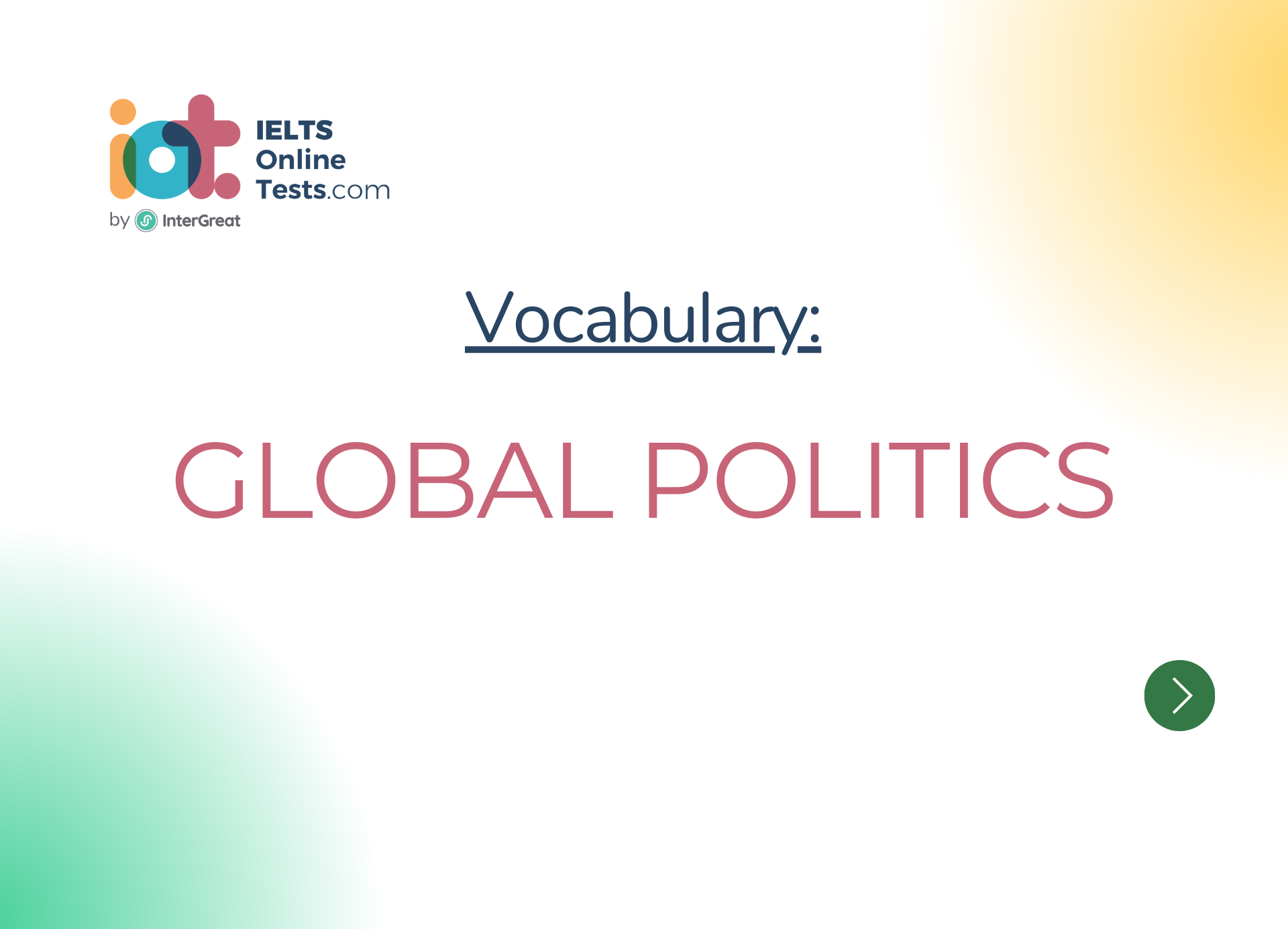
Global politics
Below is a detailed list of vocabulary related to global politics, along with their definitions. Familiarizing yourself with these terms will enable you to discuss various aspects of international relations and global political issues during the IELTS exam or any political discussions.
Diplomacy:
- Definition: The art and practice of conducting negotiations and maintaining relationships between nations to achieve specific goals.
International Relations:
- Definition: The study of interactions between countries, including their political, economic, and cultural exchanges.
Globalization:
- Definition: The process of increased interconnectedness and interdependence among nations, economies, and cultures on a global scale.
Sovereignty:
- Definition: The exclusive right of a nation to govern its own territory without interference from other states.
Multilateralism:
- Definition: The practice of cooperation and decision-making involving multiple countries or international organizations.
Bilateral Relations:
- Definition: The relations and interactions between two countries, often focusing on specific issues or agreements.
Alliance:
- Definition: A formal agreement between two or more nations to cooperate and support each other in military or political matters.
Trade Agreements:
- Definition: Treaties or pacts between countries that aim to facilitate and regulate trade and economic cooperation.
Sanctions:
- Definition: Economic or political measures imposed by one or more countries against another country to influence its behavior.
Geopolitics:
- Definition: The study of how geography, resources, and power influence international politics and relations.
International Law:
- Definition: The body of rules and principles governing the behavior of nations in their interactions with each other.
Non-Governmental Organizations (NGOs):
- Definition: Private organizations that operate independently of any government and often engage in humanitarian or advocacy work.
United Nations:
- Definition: An international organization founded to promote peace, security, and cooperation among nations.
Security Council:
- Definition: A key organ of the United Nations responsible for maintaining international peace and security.
Human Rights:
- Definition: Fundamental rights and freedoms to which all individuals are entitled, regardless of their nationality, race, or religion.
Interventionism:
- Definition: The policy of a state or international organization interfering in the affairs of another country, often to promote stability or protect human rights.
Soft Power:
- Definition: The ability of a country to influence others through its culture, values, and policies rather than through force.
Hard Power:
- Definition: The use of military and economic strength to influence or coerce other countries.
Global Governance:
- Definition: The system of international organizations, agreements, and norms that regulate global affairs.
Foreign Policy:
- Definition: A government's strategy and actions concerning its relations with other countries.
Peacekeeping:
- Definition: The deployment of military forces or civilian personnel to prevent or resolve conflicts and maintain peace in a region.
Arms Control:
- Definition: Measures and agreements to limit or reduce the production and distribution of weapons and military technology.
Nationalism:
- Definition: A strong sense of pride and loyalty to one's nation, often leading to the belief in its superiority over others.
Global Commons:
- Definition: Areas, such as the oceans and the atmosphere, that are not subject to the jurisdiction of any one country and are considered shared resources for all humanity.
Climate Diplomacy:
- Definition: The efforts of countries to negotiate and cooperate on international climate change agreements and policies.
Refugee Crisis:
- Definition: A situation where a large number of people flee their home countries due to conflict, persecution, or environmental disasters.
Terrorism:
- Definition: The use of violence and intimidation to achieve political goals, often targeting civilians.
Nuclear Proliferation:
- Definition: The spread of nuclear weapons and technology to other countries.
Rogue State:
- Definition: A country that acts in defiance of international norms and is seen as a threat to global security.
Economic Blocs:
- Definition: Groups of countries that form economic alliances to promote trade and cooperation, such as the European Union.
Remember to review and practice using these vocabulary words in various contexts to reinforce your understanding and ability to use them effectively in your speaking and writing tasks for the IELTS exam.




